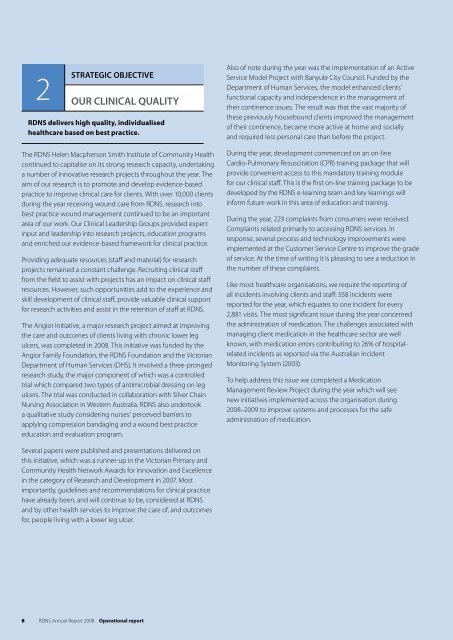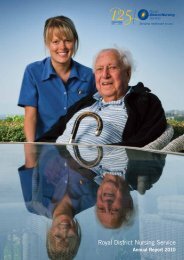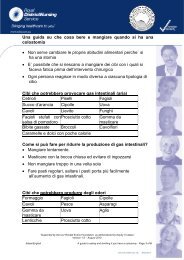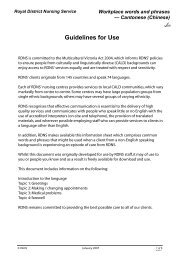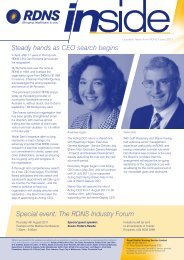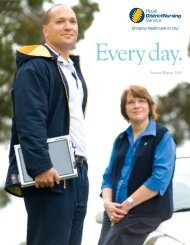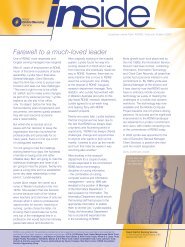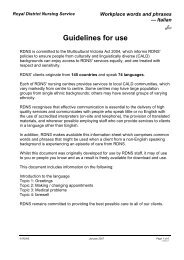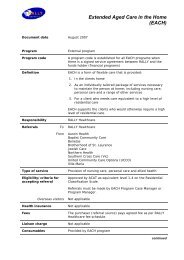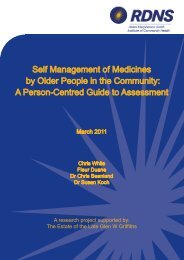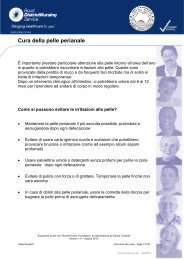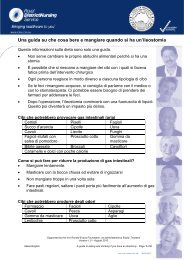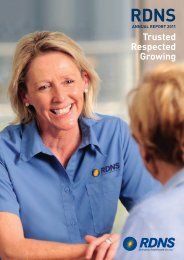RDNS 2008 Annual Report - Royal District Nursing Service
RDNS 2008 Annual Report - Royal District Nursing Service
RDNS 2008 Annual Report - Royal District Nursing Service
You also want an ePaper? Increase the reach of your titles
YUMPU automatically turns print PDFs into web optimized ePapers that Google loves.
2<br />
strategic<br />
objective<br />
our clinical quality<br />
<strong>RDNS</strong> delivers high quality, individualised<br />
healthcare based on best practice.<br />
The <strong>RDNS</strong> Helen Macpherson Smith Institute of Community Health<br />
continued to capitalise on its strong research capacity, undertaking<br />
a number of innovative research projects throughout the year. The<br />
aim of our research is to promote and develop evidence-based<br />
practice to improve clinical care for clients. With over 10,000 clients<br />
during the year receiving wound care from <strong>RDNS</strong>, research into<br />
best practice wound management continued to be an important<br />
area of our work. Our Clinical Leadership Groups provided expert<br />
input and leadership into research projects, education programs<br />
and enriched our evidence-based framework for clinical practice.<br />
Providing adequate resources (staff and material) for research<br />
projects remained a constant challenge. Recruiting clinical staff<br />
from the field to assist with projects has an impact on clinical staff<br />
resources. However, such opportunities add to the experience and<br />
skill development of clinical staff, provide valuable clinical support<br />
for research activities and assist in the retention of staff at <strong>RDNS</strong>.<br />
The Angior Initiative, a major research project aimed at improving<br />
the care and outcomes of clients living with chronic lower leg<br />
ulcers, was completed in <strong>2008</strong>. This initiative was funded by the<br />
Angior Family Foundation, the <strong>RDNS</strong> Foundation and the Victorian<br />
Department of Human <strong>Service</strong>s (DHS). It involved a three-pronged<br />
research study, the major component of which was a controlled<br />
trial which compared two types of antimicrobial dressing on leg<br />
ulcers. The trial was conducted in collaboration with Silver Chain<br />
<strong>Nursing</strong> Association in Western Australia. <strong>RDNS</strong> also undertook<br />
a qualitative study considering nurses’ perceived barriers to<br />
applying compression bandaging and a wound best practice<br />
education and evaluation program.<br />
Also of note during the year was the implementation of an Active<br />
<strong>Service</strong> Model Project with Banyule City Council. Funded by the<br />
Department of Human <strong>Service</strong>s, the model enhanced clients’<br />
functional capacity and independence in the management of<br />
their continence issues. The result was that the vast majority of<br />
these previously housebound clients improved the management<br />
of their continence, became more active at home and socially<br />
and required less personal care than before the project.<br />
During the year, development commenced on an on-line<br />
Cardio-Pulmonary Resuscitation (CPR) training package that will<br />
provide convenient access to this mandatory training module<br />
for our clinical staff. This is the first on-line training package to be<br />
developed by the <strong>RDNS</strong> e-learning team and key learnings will<br />
inform future work in this area of education and training.<br />
During the year, 229 complaints from consumers were received.<br />
Complaints related primarily to accessing <strong>RDNS</strong> services. In<br />
response, several process and technology improvements were<br />
implemented at the Customer <strong>Service</strong> Centre to improve the grade<br />
of service. At the time of writing it is pleasing to see a reduction in<br />
the number of these complaints.<br />
Like most healthcare organisations, we require the reporting of<br />
all incidents involving clients and staff: 558 incidents were<br />
reported for the year, which equates to one incident for every<br />
2,881 visits. The most significant issue during the year concerned<br />
the administration of medication. The challenges associated with<br />
managing client medication in the healthcare sector are well<br />
known, with medication errors contributing to 26% of hospitalrelated<br />
incidents as reported via the Australian Incident<br />
Monitoring System (2003).<br />
To help address this issue we completed a Medication<br />
Management Review Project during the year which will see<br />
new initiatives implemented across the organisation during<br />
<strong>2008</strong>–2009 to improve systems and processes for the safe<br />
administration of medication.<br />
Several papers were published and presentations delivered on<br />
this initiative, which was a runner-up in the Victorian Primary and<br />
Community Health Network Awards for Innovation and Excellence<br />
in the category of Research and Development in 2007. Most<br />
importantly, guidelines and recommendations for clinical practice<br />
have already been, and will continue to be, considered at <strong>RDNS</strong><br />
and by other health services to improve the care of, and outcomes<br />
for, people living with a lower leg ulcer.<br />
8 <strong>RDNS</strong> <strong>Annual</strong> <strong>Report</strong> <strong>2008</strong> Operational report


